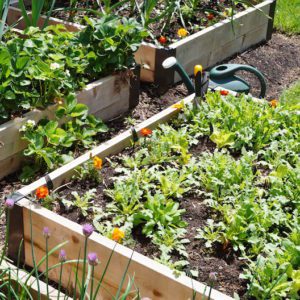When most think of a garden, they think of finely manicured soil with neat rows of beautiful plants surrounded by a picturesque fence. Anyone who has gardened knows this type of garden requires a lot of herbicide or work and is not that easy to maintain for someone who has to go to work away from the home every day. That’s why smart gardeners started using a technique that made growing your own food significantly easier in many ways. Enter: The raised garden bed! So why would a raised garden bed be easier? Sure, they might take a bit more work and money to get going, but once established there are several very important ways they make growing your own food a heck of a lot easier! Here’s why:
Why Your Garden Needs Raised Beds
Soil
Soil is a critically important factor in the success of your garden. You simply can’t grow crops in just any soil. It must be full of nutrients, composted material, fungi, carbon and more. For some people, growing right in their native soil is impossible. It’s either too sandy, full of dense clay or potentially damaging pests like nematodes. In these cases, turning to a raised bed is the best solution to grow healthy and vibrant plants. A raised bed can be filled with a rich, blended soil of your choosing, providing your plants with the nutrients and environment they need to thrive, as well as the necessary structure to give their roots exactly what they need to spread. There’s really no need to fuss with bad soil when building some beds and filling them with an expertly blended humus is so simple. You can find the perfect soil for your raised beds by searching through your local gardening groups, or from specialty businesses in your area. Once your raised beds are filled with nutrient-rich soil, don’t forget to mulch!

Water
Water is a vital resource for your plants. Without it, nothing can grow. But while plants NEED water, too much can be just as bad as too little. Ground level gardens comprised of poor draining soil can cause flooding in your beds, which can drown your plants, create an environment for disease to spread, or cause the roots to rot. Poorly draining soil can cause a massive headache, is almost impossible to fix once you’ve planted your garden, and can cause your hard work to be wiped out with just a few hard rains.
Additionally, ground soil that is too dry and loose can wick up water very quickly during a dry spell. This can be counterproductive, as the water you’re using for your plants can be carried away to feed the thirsty soil. Not only is this a waste of water, but it’s more work for the gardener to continue to ensure their garden beds are sufficiently watered. With a raised bed, not only do you avoid issues with your plants drowning, but your beds are also less likely to wick vital moisture away from your plants, thanks to your expertly selected soil that fills each of the raised beds!
Weeds
Those picturesque gardens are beautiful, but those pictures don’t tell the whole story. It’s a lot of work keeping weeds at bay—especially if you don’t want to use herbicides in the beds where you are growing vegetables that you’ll bring into your home to eat. Organic methods of weed control are time consuming, tedious, and often still allow sneaky weeds to find a way to thrive. With the introduction of raised beds in your garden, you’re much less likely to face the dreaded issue of weeds. Weed seeds are spread in a number of ways, from wind, to lawnmowers, etc. It’s much harder for those pesky weed seeds to find their way up into your raised beds, thanks to the tall sides…the taller the better! Additionally, weeds become much easier to spot and deal with before they become too much of a problem!

Ease
Simply put—raised beds are easier. Sure, they might take a bit more time and materials to build, but they can last for years to come and will save you from a number of issues that make them light years easier to work on than growing flowers, vegetables, and other plants directly in the ground. Here are a few important ways they make gardening easier: less watering means more time to spend on other garden work. Less weeds means less weed pulling. Higher beds mean it’s much easier to plant seed and plugs. Harvesting becomes significantly easier too. If you’re a dog owner who has ever tried to keep a garden, you know how frustrating it can be when they trample your delicate plants and destroy your hard work. Chicken owners can have an easier time avoiding those pesky, scratching legs and hungry beaks. You see, there are truly countless reasons why a raised garden makes gardening easier!
As you can see, there’s no wonder why raised gardens are growing more and more popular. They make your time in the garden a lot easier to manage, providing your peace of mind and a significantly higher chance of achieving success in the growing season. If you’re curious about how to build a garden bed—or need some ideas to get started—stay tuned for a future post about how to do just that! Have you made the switch to a raised bed? Share your experience with us in the comments below!